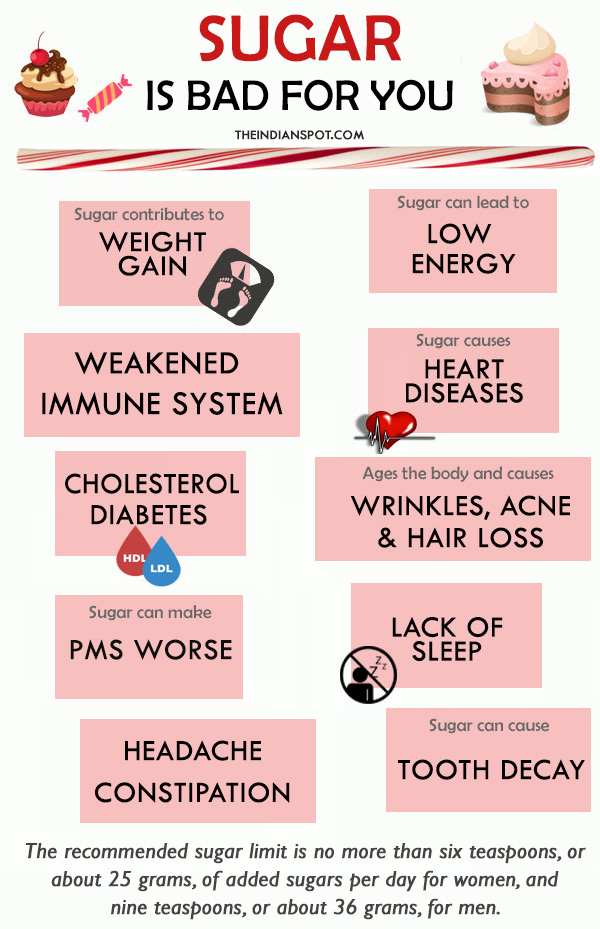Sugar is delicious and tempting and even comforting. But it’s also deadly for your health, your waistline, and your mind. Not only does it cause health problems, but also makes your self-control poor. Anything in excess is bad for your health and so is the thing with sugar. It is important to make the distinction between added sugar and sugar that occur naturally in foods like fruits and vegetables. The naturally occurring sugars are absolutely fine. However, added sugars are those that are added to foods. The most common added sugars are regular table sugar or high fructose corn syrup.
 If you want to lose weight and optimize your health, then you should do your best to avoid foods that contain added sugars. Here are the bad effects sugars have on you:
If you want to lose weight and optimize your health, then you should do your best to avoid foods that contain added sugars. Here are the bad effects sugars have on you:
WEIGHT GAIN
High levels of fructose in particular makes you far more likely to overeat. However, this isn’t the only reason that sugar causes weight-gain. Because sugar stresses the pancreas by forcing it to produce elevated levels of insulin, other hormones are neglected such as those which regulate weight, stress, digestion, and metabolism. More: Foods high in sugar.
LOW ENERGY
Consuming excess sugar can increase fatigue as it depletes energy. Sugar can lead to hyperactivity (blame the rapid rise of adrenaline). Fuelling your body with sugar-free alternatives will ensure you have the strength and stamina to perform at your peak.
INCREASED ILLNESS
A diet rich in sugar and refined carbohydrates is one of the main culprits behind inflammation in the body. Conditions like asthma, allergies, heart disease and even cancer are actually caused by chronic inflammation in the body. When you reduce or quit sugar, you eventually protect your body from inflammatory responses and illness.
HEART DISEASES
Added sugar chronically raises insulin levels, which activates the sympathetic nervous system, increasing blood pressure and heart rate. Foods with high glycaemic index can increase the risk of cardiovascular diseases. Within a few weeks’ time after quitting sugar, you might expect to see a 10% decrease in LDL cholesterol and a 20 to 30% decrease in triglycerides.
CHOLESTEROL
There is an unsettling connection between sugar and cholesterol. Sugar overload could spark your liver to churn out more bad cholesterol while also inhibiting your body’s ability to clear it out. This way, you increase your cholesterol levels and also risks associated with it!
WRINKLES, ACNE AND HAIR LOSS
Sugar is said to make you age faster! This is because regular consumption of sugar makes your skin saggy and prone to wrinkles making you look old. Sugar attacks skin proteins, damaging them, including protein fibres in collagen and elastin, the components that keep your skin firm and elastic.
DEPRESSION
Sugar is believed to affect our mental health in two ways. Firstly, it suppresses activity of the important growth hormone BDNF. Sufferers of depression and schizophrenia are known to have critically low levels of BDNF levels in the brain. Secondly, it causes a chain of chemical reactions that promote chronic inflammation. More: Benefits of quitting sugar >>
SLEEPLESSNESS
Added sugar in your meals triggers the release of the hormone cortisol, which interferes with your sleeping patterns. Give up added sugar, and you should be more awake and alert during the day, and also will sleep better during the night.
How much Sugar Intake per day?
Added sugar or free sugars – the ones we want to cut down on – aren’t always labelled as sugar, so can be tricky to spot. The following are all sugars: agave nectar, corn sweetener, dextrose, honey, corn syrup, sucrose, fructose, glucose and molasses. Make sure you read the labels. Look at ‘carbohydrates (of which sugars)’ on the nutrition label. If the total sugar content is over 22.5g per 100g the food is high in sugar; if it is below 5g per 100g the food is low in sugar. More on how to read food label.
The American Heart Association recommends no more than six teaspoons, or about 25 grams, of added sugars per day for women, and nine teaspoons, or about 36 grams, for men. To put this into perspective, a typical 330ml can of fizzy drink can contain up to 35g or 9 teaspoons of added sugar.